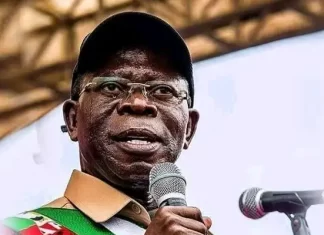Nigerians are impatient for growth. Millions of employable Nigerians are struggling with the harsh realities of unemployment. We urge them to be creative, resourceful and enterprising in order to work their way out of poverty. We know, however, that their options are limited. Our inadequate transportation, power supply, water and sanitation, ICT and healthcare and more limits the options for self-advancement. The key to opening opportunities for Nigerians seeking advancement is to invest in our roads and railways, power, water and sanitation and all other aspects of our physical and social infrastructure.
It is estimated that an investment of over USD 2.9 trillion (NGN 460 trillion) is required for the next 30 years in Nigeria’s infrastructure and that a yearly average of USD 25.2 billion (NGN 4 trillion) investment is required over the next five years. (See the National Integrated Infrastructure Master Plan launched in December 2013). The Federal Government’s allocation to capital projects (under which lies infrastructure) in the 2014 budget stands at 27 per cent., representing NGN 1.1 trillion.
There is clearly a huge deficit which the government is aware of. To address the deficit the government has encouraged the private sector to invest in Nigerian infrastructure and has promoted public-private partnerships (“PPPs”) as a vehicle for channeling private sector investments. However, the levels of private sector investment have been uninspiring. I propose that we reconsider the sequence for seeking private sector investment for our infrastructure development and suggest a way forward.
We need private sector funding to supplement our infrastructure finances. However, at what stage should we seek private sector investment? Can we rely on private sector funding for the construction of our infrastructure? We have to be realistic in our expectations. The private investors we wish to attract are often foreign institutional investors who must account to their clients for their investment decisions. They need to be in a position to make a calculated assessment of the risks involved in their investment, be satisfied that they are working with reliable data, be reasonably comfortable that their capital is secure and be comfortable with the level of political risk they take on.
The construction of our infrastructure involves significant risks for foreign investors. Nigeria does not have a track record for executing PPP transactions, we do not have a good record for good governance and transparency in our corporate affairs and political and security risk remains high. It will therefore come as no surprise when private investors seek extensive guarantees that drive up the cost and timeframe of our projects. Chasing PPP arrangements for the construction phase of infrastructure projects have unsurprisingly been time consuming and involved delays that we cannot afford.
It is far better to finance the construction of our projects using our own resources and, following construction, to seek refinancing from private investors. We must start the process of building our core infrastructure from our own resources while we simultaneously prepare the framework for engaging with private investors at a later stage and on terms that work better for the Nigerian public.
Where would the own resources come from? The primary financing source must be the government budget – we must commit as much of our public resources as we can allow with a view to liquidating the government’s investment at the earliest opportunity by selling bankable portions of the project to private investors.
In addition to the government budgetary allocation, the Nigerian public should be given an incentive to invest their savings in transformational infrastructure projects in Nigeria. Structured investment arrangements could be designed that provide an avenue for investment on terms that include a return on capital while accommodating risks that may be unpalatable to foreign investors. Raising funding for specific projects should increase enthusiasm for the fund-raising. Imagine being called upon to invest in a railway network that connects the north and south of Nigeria; thoughts of the resulting exponential growth of commerce will encourage me to invest in the project. Generations of Nigerians will owe a debt of gratitude to those who help bring about infrastructure projects that allows them to grow and thrive. The investment by Nigerians will act as a catalyst for investment by non-Nigerians.
Nigerian industrialists and business magnates ought to take a lead in demonstrating their confidence in Nigeria by investing in the country as Aliko Dangote has done. When I recall the documentary/drama: The Men Who Built America, I marvel at the story told of the men whose industrial innovations and business empires revolutionised America. The men – Cornelius Vanderbilt (steamboat and railroad), John D. Rockefeller (railroad and oil), Andrew Carnegie (steel), J.P. Morgan (electric power) and Henry Ford (automobiles) – are now credited with having built America. I believe that we have Nigerians of similar stock; Nigerians able to employ their financial might in ventures that would elevate Nigeria to unimaginable heights and usher Nigerians on the road to dignified self-development. Perhaps the story will one day be told of the men and women who built the new Nigeria.
Uwaifo is a partner in the London office of the international law firm, Fasken Martineau.












